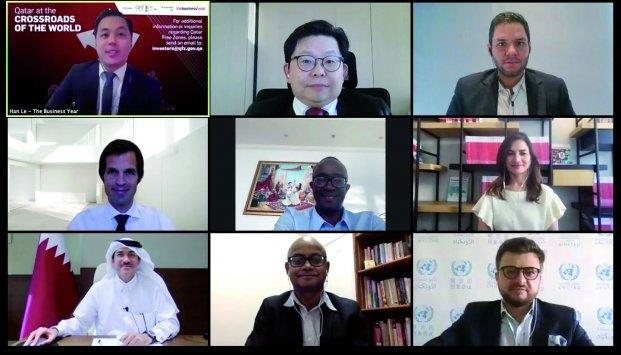
Qatar- QFZA leads discussion on global trade resilience & FDI
Doha: H E Ahmad bin Mohamed Al Sayed, Minister of State and Chairman of Qatar Free Zones Authority (QFZA) has said that cost-efficiency can no longer be the solitary guiding principle of supply chains.
The world must make sure that supply chains not only deliver value for money but they are also resilient to future circumstances so the global economy can keep moving. The Minister was addressing digital roundtable co-hosted by QFZA, in conjunction with The Business Year media group.
The event, attended by some of the world's leading experts in supply chains and foreign direct investment (FDI), including representatives from United Nations Conference on Trade and Development (UNCTAD), the World Economic Forum (WEF), and logistics experts DHL, Bayer Pharmaceuticals and Reybanpac, examined how global trade can adapt to the new realities presented by COVID19.
Al Sayed said: 'The true impact of these circumstances may not be truly felt for some time to come, but debates that were already underway over how supply chains can be rebalanced have now become urgent.
For Qatar this is not a new debate. During the past few years, the state managed to rapidly diversify its local and global supply chains to keep its economy connected to the world, while maintaining resilience and diversification.
He added: 'QFZA built one the world's most advanced digital and logistical ecosystems in its Free Zones. This gives companies investing in the Zones, access to a diverse set of physical and digital entry points into global supply chains, either through its advanced telecommunications infrastructure, or the world spanning air and deep sea ports that allow major companies to maintain their leading positions in the global logistics industry. The Zones also provide flexible and diverse solutions to all companies looking to invest in the State of Qatar, especially the New Economy companies, this is in addition to providing the opportunity to partner with leading Qatari companies such as: Qatar Petroleum, Qatar Airways and the Supreme Committee for Delivery and Legacy.
Speaking on behalf of the UNCTAD following their recent report on global FDI, Dr. Oktawian Kuc, Investment Policy Officer of the Division on Investment and Enterprise, said 'Special Economic Zones remain an invaluable tool for policy makers trying to boost FDI inflows.
He went on to highlight all the indirect benefits that they bring to economies beyond FDI like economic diversification, the shortening of supply chains and employment creation. The effects of the pandemic on global supply chains have exacerbated an already stressed system suffering under the rising tide of economic nationalism and protectionism.
Add to this the emergence of advanced technologies of the New Industrial Revolution (NIR) such as automated distribution and manufacturing hubs, and the world is now rapidly undergoing unparalleled changes in terms of how global supply chains can build in resilience whilst remaining profitable.
The Business Year CEO Ayşe Valentin, commented: 'The Business Year strongly believes that Qatar, thanks to its strategic geographical location and its economic and commercial flexibility, is set to play a vital role. Amadou Diallo, DHL's Middle East and Africa CEO, said of the Free Zones: 'Qatar Free Zones have the latest technologies and all the required digital and physical infrastructure to optimize our business operations in the Zones.
Vincente Andres Wong, Commercial Manager of food wholesaler Reybanpac Ecuador was impressed with the adaptability and resilience of Qatar's supply chains 'Qatar is an excellent getaway to the entire Middle East and Asia regions for Latin American producers.
He also highlighted the beneficial fiscal incentives and supportive trade regulations offered to global agriculture and food and beverages players that allow them to compete with geographically closer producers based in Asia or Europe.
Quentin Descat, Head of Marketing & Marketing Operations Middle East for Bayer Pharmaceuticals, said that Bayer's production and distribution activities were not as heavily affected as other industries because pharmaceutical logistics has built-in resilience to its supply chains.
Speaking more broadly about the strategic importance of bringing more pharmaceutical companies to the Gulf, the CEO of QFZA, Lim Meng Hui, shared the industry's concerns about setting up R & D operations in the region: 'for the pharmaceutical industry, its success depends on the availability of the appropriate and approved legal frameworks to protect the intellectual property rights of such companies. That's why the government of Qatar has worked so hard to implement a robust legal framework to protect companies' intellectual property. '
Dr. Amitendu Palit, Senior Research Fellow from WEF, explained that the unprecedented economic and trade disruption required a unified global response and that countries must resist the urge of protectionist policies if supply chains are to continue functioning effectively for global markets.

Legal Disclaimer:
MENAFN provides the
information “as is” without warranty of any kind. We do not accept
any responsibility or liability for the accuracy, content, images,
videos, licenses, completeness, legality, or reliability of the information
contained in this article. If you have any complaints or copyright
issues related to this article, kindly contact the provider above.

















Comments
No comment